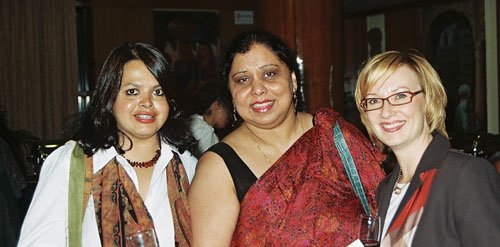|
The Annual Winter Course on Forced Migration,
Racism, Immigration and Xenophoebia is supported by The Government
of Finland, the United Nations High Commissioner for Refugees (UNHCR),
New Delhi, and the Brookings Institution, Washington DC. With their
un-stinted support and goodwill, the programme has become one of the
most well known events in the field of forced migration studies, and
an academic event in Kolkata. Preparation for the Sixth Winter
Course on Forced Migration commenced on 14 December 2007, a day
before the Fifth Winter Course formally ended. By that time, CRG
members and its collaborators had realised that the Winter Course
has grown into a full-fledged programme with components of research,
networking, particularly partnership between Indian and Finnish
institutions, and training under innovative and different formats.
This was later accepted and endorsed by the advisors during the
advisory committee meeting in 5-6 April 2008.
The collaborative nature of the programme was
underlined from the beginning by the participatory nature of the
advisory meeting. The Sixth Winter Course Advisory Committee Meeting
on 5-6 April 2008 discussed the following issues.
-
How do we
create a forum of ex participants? What are the ways of
generating resources?
-
The journal
Refugee Watch has no secure funding, and is supported from the
Winter Course budget. Are there other ways of securing support
for the journal, especially since Refugee Watch is used as a
primary reading material for the Winter Course? The readership
of Refugee Watch should be widened.
-
Suggestion
was given to draw up a list of universities for wider
circulation of notification. It was agreed that CRG would use
the mailing list of Panos to disseminate the journal.
-
It was
decided to give more importance on the module on Climate Change,
which could be made compulsory. There was a need to familiarize
participants with disaster management policies and practices of
South Asian countries.
-
The media
segment of the Winter course would continue to be the public
face of the Winter course. The film screenings/photo exhibition
will be open to all apart from media activists, journalists.
Due to the growing popularity of the course,
the advisory committee asked the organisers in 2006 to look into
possibilities of organizing short courses in collaboration with
willing centres and departments of Universities in India as
follow-up activities. As a result of a series of follow-up
activities, CRG is building partnerships with many new institutions.
A number of organisations and institutions have shown willingness to
collaborate with CRG on this. CRG remains grateful to all the
organisations that have showed willingness to collaborate on
programmes on forced migration.
CRG organized a planning meeting on 18 June
2008 in Kolkata to plan the media component of the Winter Course.
The participants of the meeting included well-known media activists
and practitioners based in Kolkata. Sanjoy Barbora and Qazimuddin
Ahmed from our collaborating organization Panos South Asia, Guwahati
also attended the meeting.
Some of the suggestions and observations of
the meeting are listed below: -
-
Inclusion of
more of South Asia component into the segment
-
Choosing a
more general theme for the segment instead of a region-specific
theme for the participants to identify with the theme
-
Involve
participants in internet auditing exercise
-
A small team
to co-ordinate with the conference organizers regarding the
people to be invited, themes to be chosen for the films,
finalise the design of the web. The team should consist of
people adept at web planning and web designing.
The Winter Course is a product of some of the most effective
collaborations with a number of both national and international
institutions. The one-and-half-day media programme was possible with
the support from Panos South Asia. The field trip to Malda was
organized with the help of Ganga Bhangon Pratirodh Action Nagarik
Committee (Citizens’ Committee for resisting erosion of the Ganges)
– an action group working with the victims of riverbank erosion in
the region. Besides, the National Human Rights Commission (Nepal and
Sri Lanka) nominated one of their officers respectively to be a
participant of the Sixth Winter Course on Forced Migration.
Fellowship Programme
This year three fellowships were given as part of the Indo-
Finnish Exchange programme. Alina Pathan came from University of
Helsinki and spent a fortnight at CRG in January 2008 worked on the
theme “Impact of Climate Change on Migration in India”. Two Indian
participants, Sahana Basavapatna and Geetisha Dasgupta will be sent
to Finland for a week. Sahana Basavapatna worked on Implementation
of the Finland’s Alien’s Act 2004, in the context of European Common
Asylum Policy and Select Immigration Experiences of Highly skilled
Migrants from South Asia to Finland.
Research Programme
The CRG has designed and organized a number of researches on the
theme of forced migration in collaboration with different institutes
in South Asia. The winter course is designed to provide vital inputs
to CRG’s ongoing research. CRG as a research organization takes
advantage of the presence of a number of experts and specialists in
the field of forced migration. Some of the term papers of the Sixth
Winter Course participants were selected for the publication –
Refugee Watch Issue No. 31 and 32. During the Sixth Winter Course we
released a collection of articled from Refugee Watch- Fleeing
People of South Asia: Selections from Refugee Watch
edited by Sibaji Pratim Basu. The research papers of Tinna Kanninen
, Sanam Roohi and Ishita Dey recipients of the Second Indo Finnish
Exchange Programme will be published shortly. Two research papers on
Cooper’s Camp, West Bengal (one of the oldest transit refugee
centres post partition) by Anasua Basu Ray Chaudhury and Ishita Dey
have also been published.
 |
From Left to Right: Nayana
Bose, Paula Banerjee and Sanna Selin
|
|